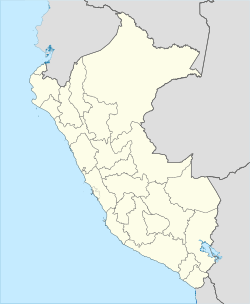Puerto Arica (Maynas) facts for kids
Quick facts for kids
Puerto Arica
Puerto Arica
|
|||
|---|---|---|---|
|
Town
|
|||
|
|||
| Nickname(s):
The city of the survivors (Spanish: La ciudad de los sobrevivientes)
|
|||
| Country | |||
| Department | Loreto | ||
| Province | Maynas | ||
| District | Napo | ||
Puerto Arica is a town in Peru. It is part of the Maynas province in the Loreto region. The town is located on the banks of the Napo River in northwestern Peru.
History
A New Home for Survivors
The original city of Arica was in southern Peru. During a big conflict called the War of the Pacific, Chilean soldiers took control of Arica. This happened a long time ago. After the war, a peace agreement called the Treaty of Ancón was signed. This treaty gave a lot of Peruvian land to Chile, including Arica. Later, another agreement, the Treaty of Lima, officially made Arica part of Chile.
Many people who lived in Arica had to leave their homes. The Peruvian government helped these people find new places to live. They were sent to the Loreto region to help settle the area. People from another town called Tarapacá went to Nuevo Tarapacá. Those from Arica settled in what became this new town, Puerto Arica.
However, the story didn't end there. Another treaty, the Salomón–Lozano Treaty, changed the borders again. This area was given to Colombia. So, the settlers from Arica had to move once more. They moved south to Maynas Province in eastern Loreto. That's why Puerto Arica is sometimes called "The city of the survivors."
Symbols
The town of Puerto Arica uses the same flag and the same coat of arms as the Chilean city of Arica.
Transportation
Most travel in Puerto Arica happens on the Napo River. This river connects the town to nearby places like Mazán, Indiana, and Santa Clotilde. There is also a road that links Puerto Arica to Flor de Agosto. This town is about 50 minutes away and is near the border with Colombia.
Religion
Most people in Puerto Arica are Christians. The largest group are evangelicals, followed by Catholics. There are also a small number of Jews and people who follow indigenous religions. Some residents are part of the Evangelical Association of the Israelite Mission of the New Universal Covenant.
See also
 In Spanish: Puerto Arica (Maynas) para niños
In Spanish: Puerto Arica (Maynas) para niños
 | DeHart Hubbard |
 | Wilma Rudolph |
 | Jesse Owens |
 | Jackie Joyner-Kersee |
 | Major Taylor |




